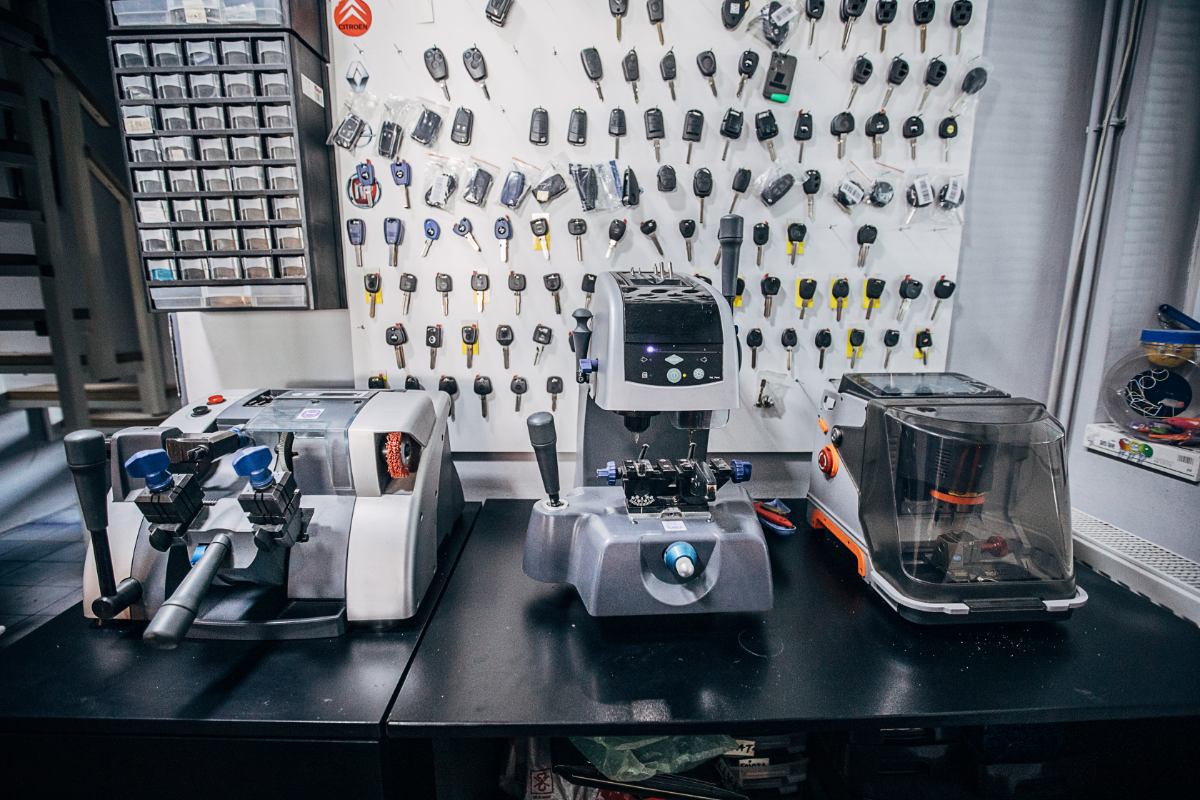Locksmiths play a crucial role in our everyday lives, often working behind the scenes to ensure our safety and security. From the moment we lock our doors at night to the times we find ourselves locked out of our homes or vehicles, these skilled professionals are there to help us regain access and protect our belongings. Understanding the role of a locksmith goes beyond just recognizing them as service providers; it involves appreciating their expertise, training, and the essential services they offer.
The profession of locksmithing has evolved significantly over the years, adapting to advancements in technology and changing security needs. Modern locksmiths are not only adept at traditional lock and key mechanisms but also skilled in the latest electronic locking systems and security technology. This dual expertise allows them to provide a wide range of services, from simple key cutting to installing sophisticated security systems in homes and businesses.
Moreover, locksmiths contribute significantly to our peace of mind. Knowing that we have access to a professional who can assist in emergencies—whether it’s a broken key, a lost key, or a malfunctioning lock—instills confidence in our daily routines. This article aims to address the top five most common questions about the locksmith profession, shedding light on their qualifications, services, pricing, myths, and how to find a reliable locksmith. By exploring these topics, we hope to equip you with valuable knowledge that enhances your understanding and appreciation of this essential trade.
What Qualifications Are Needed to Become a Locksmith?
Education and Training Requirements
To become a locksmith, one typically needs a high school diploma or equivalent. Many aspiring locksmiths pursue vocational training programs that focus on lock technology, key systems, and security techniques. These programs may be offered by community colleges, technical schools, or specialized locksmith training institutes. The duration of these programs can vary, often ranging from a few months to a year, depending on the depth of the curriculum.
Hands-on experience is also crucial in this profession. Many locksmiths begin their careers as apprentices, working alongside experienced professionals to learn the trade. This apprenticeship provides practical training in various aspects of locksmithing, including lock installation, repair, and the intricacies of different locking mechanisms.
Certifications and Licensing
In many regions, locksmiths are required to obtain a license to practice legally. The requirements for licensing vary by state or country, but they generally involve passing an exam that covers both practical skills and theoretical knowledge. Additionally, many locksmiths choose to obtain certifications from professional organizations, such as the Associated Locksmiths of America (ALOA) or the Locksmiths’ Association, which can enhance their credibility and demonstrate their commitment to the profession.
What Types of Services Do Locksmiths Provide?
Residential, Commercial, and Automotive Services
Locksmiths offer a diverse array of services tailored to different sectors. Residential locksmith services typically include lock installation, repair, and replacement, as well as rekeying existing locks to enhance home security. They may also install smart locks or security systems that integrate with home automation.
Commercial locksmiths cater to businesses, providing solutions such as master key systems, high-security locks, and access control systems. They are often called upon to assess the security needs of a business and recommend appropriate measures to safeguard assets.
Automotive locksmiths specialize in vehicle lock and key services, addressing issues such as lockouts, key duplication, and ignition repair. With advancements in vehicle technology, many automotive locksmiths are trained to work with electronic keys and transponder systems.
Emergency Lockout Services
One of the most well-known services provided by locksmiths is emergency lockout assistance. Whether locked out of a home, car, or office, locksmiths are equipped to quickly and safely regain access. Emergency services are available 24/7, offering peace of mind to individuals who find themselves in urgent situations. A professional locksmith uses specialized tools and techniques to unlock doors without causing damage, ensuring a prompt resolution to the problem.
How Much Does a Locksmith Charge for Services?
Factors Influencing Pricing
The cost of locksmith services can vary widely based on several factors. One significant determinant is the type of service required—emergency services, such as lockout assistance, often incur higher fees due to the immediate response needed. Additionally, the complexity of the lock or security system can impact pricing; high-security locks or electronic systems may require more time and expertise to service.
Geographical location also plays a role in pricing. Locksmiths in urban areas may charge more due to higher demand and living costs. Finally, the locksmith’s experience and reputation can affect their rates; seasoned professionals with a strong track record may command higher fees for their expertise.
Average Costs for Common Services
While pricing can vary, here are some average costs for common locksmith services:
- Emergency Lockout Service: $50 – $150, depending on the time of day and complexity.
- Rekeying a Lock: $20 – $50 per lock.
- Lock Installation: $50 – $200, depending on the type of lock.
- Key Duplication: $1 – $5 for standard keys; more for specialized or electronic keys.
- Automotive Services: $75 – $300 for car key replacement, depending on the make and model.
These costs serve as general guidelines; it’s always best to obtain a detailed estimate from a locksmith before proceeding with any services.
What Are the Common Myths About Locksmiths?
Debunking Misconceptions
Several myths surround the locksmith profession that can lead to misunderstandings. One common misconception is that all locksmiths are equally qualified. In reality, the level of expertise and training can vary significantly among locksmiths, making it essential to verify qualifications and licenses.
Another myth is that locksmiths can open any lock without damage. While experienced locksmiths have a wide range of tools and techniques at their disposal, some locks may be resistant to non-destructive entry methods. In such cases, a locksmith may need to drill the lock or use other forceful methods, potentially damaging it.
Understanding the Realities of the Profession
Many people also believe that locksmithing is a simple, low-skill job. In truth, locksmithing requires a deep understanding of mechanics, electronics, and security systems. It involves continuous learning, as technology is constantly evolving. Professional locksmiths invest time in staying updated on the latest advancements and techniques in the field.
How Can You Find a Reliable Locksmith?
Tips for Hiring a Trusted Professional
Finding a reliable locksmith is crucial for ensuring the safety and security of your property. Start by asking for recommendations from friends, family, or neighbors who have had positive experiences with locksmiths. Additionally, online reviews and ratings can provide valuable insights into a locksmith’s reputation.
Before hiring a locksmith, it’s essential to verify their credentials. Check if they are licensed and insured, as this protects you in case of any damages or mishaps during service. A reputable locksmith will also provide a written estimate before commencing work, ensuring transparency in pricing.
Importance of Reviews and Recommendations
Online reviews and testimonials can greatly assist in your search for a trustworthy locksmith. Look for locksmiths with consistently high ratings and positive feedback regarding their professionalism, quality of work, and reliability. Websites like Yelp, Google, or the Better Business Bureau can be valuable resources for assessing a locksmith’s reputation.
In addition to online reviews, consider reaching out to local locksmith associations or organizations. These groups often maintain directories of certified professionals, ensuring that you choose someone with the appropriate training and credentials.
By taking these steps, you can find a reliable locksmith who meets your needs, providing you with peace of mind and assurance in their services.
The role of professional locksmiths extends far beyond simply unlocking doors or duplicating keys; they are vital guardians of our security and peace of mind. Whether you are a homeowner looking to enhance your property’s safety, a business owner needing to secure valuable assets, or a driver facing an unexpected lockout, the expertise of a qualified locksmith can provide essential solutions to a wide array of challenges. Their skills not only protect us from potential security breaches but also ensure that we can access our homes and belongings when emergencies arise.
As we have explored, the locksmith profession is steeped in knowledge and technical skill, requiring appropriate training, certifications, and a commitment to staying current with evolving security technologies. This dedication to professional development is what sets reputable locksmiths apart and instills confidence in their services.
Given the importance of these professionals, it’s essential to seek help from qualified locksmiths whenever you face lock-related issues. By doing so, you not only guarantee effective and safe service but also support skilled tradespeople who uphold the integrity of their profession. Always take the time to research, verify credentials, and gather recommendations when hiring a locksmith.
In a world where security is paramount, having a trusted locksmith by your side can be invaluable. Remember, investing in a qualified locksmith today means investing in your safety and security for the future.

I’m Marcel Brandt, a locksmith with over 15 years of experience. I specialize in modern security solutions and love sharing tips to help fellow locksmiths succeed in their careers.




